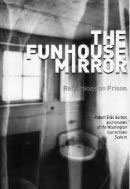OVER 2 MILLION Americans are now incarcerated, more people than live in the state of West Virginia, and proportionately by far the largest prison and jail population of any Western country. During the 1990s, while the crime rate declined, the number of Washingtonians in prison doubled.
THE FUNHOUSE MIRROR
by Robert Ellis Gordon (Washington State University Press, $14.95)
Their status in our society is elegantly reflected by a cartoon-style map of Monroe, Wash., issued by the Sky Valley Chamber of Commerce, which Robert Ellis Gordon describes as including:
thirty-nine office buildings, seventy-three clearly delineated storefronts, sixty-one business signs replete with phone numbers, one bowling alley, seventeen named streets, an old-fashioned locomotive, a set of train tracks, a blue sky, one puffy white cloud, one distant snow-capped mountain, one set of foothills, eighty-five trees, a man on a bicycle, a kid on a skateboard, a farmer plowing, a pruner pruning, sixteen cars, eleven laughing children, one bear, two sheep, and a cow.
The three enormous high-security prisons that loom over Monroe, defining much of the town’s existence, are not on the map.
For nine years, Gordon routinely ventured into and out of Monroe and several other socially invisible Washington prisons, teaching intensive fiction-writing workshops to inmates and eliciting their often harrowing stories, some of which he includes in The Funhouse Mirror. They are stories from within prison and from outside lives that were frequently violent, abusive, impoverished, despairing, and drained of hope. They are stories we usually don’t hear, even when they are told.
This is a slim book but also a riveting, searing, big-hearted book, full of the grim realities and the refusal (sometimes) to give in that characterize our American gulag. The American public desperately needs to know about these realities—not in order to absolve people for their crimes but to put a human face on an often breathtakingly inhumane prison culture, and to shine a light on our collective heart of darkness, a heart shared as much by the rest of us as by the prisoners, guards, and administrators themselves.
It helps both his pupils and his readers that Gordon is an exceptionally fine and evocative writer. Too often in books with political themes, the writing is lousy, leavened only by the value of the information buried in the dreadful prose. Not so in The Funhouse Mirror. An evocative sample:
Mona’s official job title was “Administrative Assistant.” But that title was just a cover, a ruse. For Mona’s true mission—as almost everyone but the dumbest, most tone deaf guards and the most disengaged administrators perceived—was far more interesting and dangerous. Mona’s job was to breathe life into the prison.
She plied her trade in a dazzling manner. She was beautiful. She was brazen. She was unconditionally compassionate. And Mona’s sexual energy was preternatural . . . Regardless of a prisoner’s crime, no matter how brutal and twisted, she made it her business to lend a sympathetic ear.
And that wasn’t all Mona did. She smuggled in cookies and ice cream. She bantered and joked with Crips and with Bloods, with buffed out neo-Nazis, with whomever. And she gave solace to the outcasts: the sex offenders.
The Big Yard would get quiet when Mona walked past. To say she was adored is to put it mildly. Even some of the toughest, most unrepentant cons—men who’d killed just for pleasure and kicks—spoke softly, tenderly, and in reverential tones when the topic of discussion was Mona. . . .
One of the many strengths of this volume is that Gordon wrestles repeatedly with the difficult question of whether it is appropriate to be appalled when inmates who have committed, at least once in their lives, a horrific crime—desensitized brutes who have raped or stabbed or shot another human being—are in turn subjected to endless years of horrific taxpayer-mandated treatment at the hands of fellow inmates, sadistic guards and administrators, and a fickle but generally vengeful justice system. Can we, and should we, feel sympathy for such foul creatures? Gordon generally thinks so—and I would add that treating such people humanely is all that separates us from them—but the fact that the author acknowledges these all-too-human conflicts lends that much greater a moral resonance to his book.
The punch line to this story is that Gordon no longer teaches in the prisons, no longer helps inmates tell their stories, confront their demons, and, just perhaps, become more whole and healed citizens before their release. In yet another unheralded round of tough-on-crime posturing, not newsworthy precisely because it’s so common, in 1997 the Washington State Legislature eliminated funding for most prison education programs, including the one that made this wonderful book possible. The loss is everyone’s.







